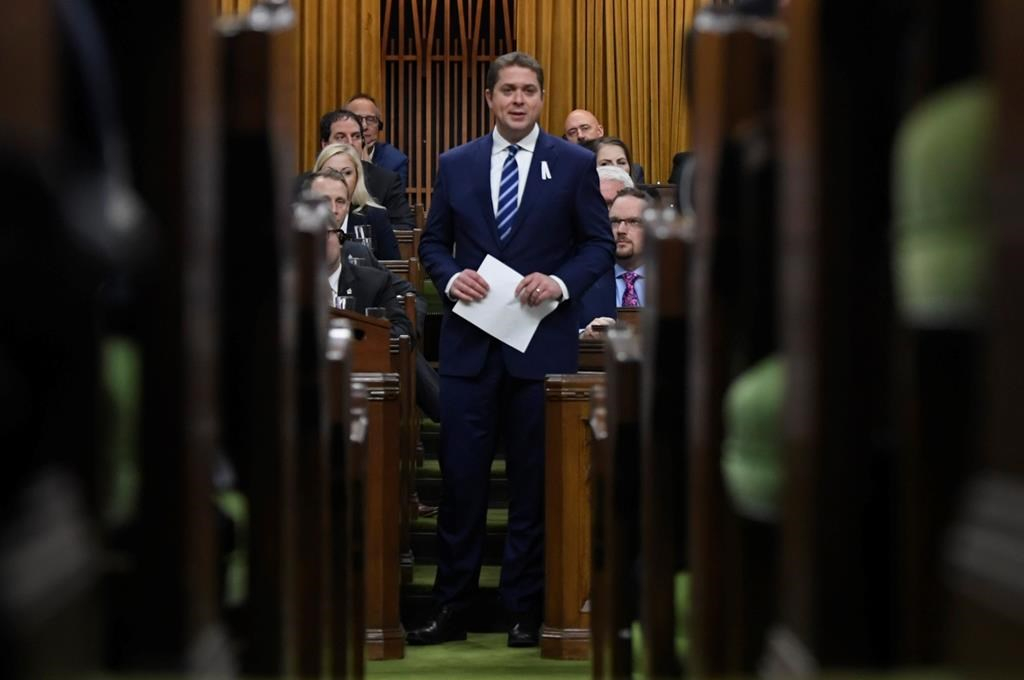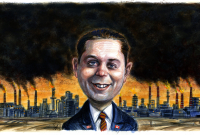Andrew Scheer will never relent

Canada's new minority Parliament got down to work Friday with Andrew Scheer staking out the Conservatives' ground as the only party that will unabashedly support the energy sector and never relent on its opposition to carbon taxes.
Responding to the Liberal throne speech that opened the new session of Parliament on Thursday, the Conservative leader proposed an amendment that would, among other things, commit the government to scrapping the carbon tax and stopping what Scheer called "the attack on the western Canadian economy."
All the other parties in the House of Commons support the tax and advocate bolder action to tackle climate change making it virtually impossible for the Conservatives to find support for the amendment.
Scheer, who is fighting to retain his post as leader amid heavy criticism from some within his own party over his handling of the recent election campaign, appeared to be comfortable isolating his party in Parliament. He was dismissive Friday of those who blame his inability to defeat the Liberals in the Oct. 21 election, at least in part, on his failure to offer a credible plan to combat climate change.
"Over the past several weeks, there has been a chorus of voices from elite corners of Canadian high society demanding that our party endorse the carbon tax," Scheer told the House of Commons.
"Let me be clear. We will always oppose a carbon tax because we know the real cost it imposes on the Canadian people."
Scheer, who represents a Saskatchewan riding, cast himself as an unabashed champion of the two oil-producing western provinces, which delivered all but one seat to the Conservatives and spurned the Liberals entirely. He echoed Alberta Premier Jason Kenney in accusing "a network of foreign-funded activist groups" of trying to block pipelines and "permanently shut down Canada's energy sector and drive hundreds of thousands of Canadians out of work."
Scheer laid the blame for what he deems is a "national unity crisis" on the environmental policies adopted by Prime Minister Justin Trudeau during his first mandate.
In a later speech deconstructing Scheer's remarks point by point, Trudeau noted that the Conservative leader bemoaned the impact of the carbon tax on families without mentioning that they will receive compensation from the federal government that, on average, will actually put more money in their pockets.
"If one wanted to truly bring down the temperature and the anxiety in the West, pointing out that fact might actually help," Trudeau said.
Trudeau also noted that more than 60 per cent of Canadians voted for parties that support stronger action on climate change, while more than 60 per cent voted for parties that support expansion of the Trans Mountain pipeline — a balancing act between the environment and the economy that is at the heart of the Liberal government's policy.
"That failed approach of blaming climate activists for not getting pipelines built does not work," Trudeau said. "The Conservatives have been hurting the West by insisting on that kind of fear mongering."
By and large, the tenor of the debate and the subsequent to-and-fro in the first question period of the new Parliament was civil and respectful, with none of the hyper-partisan, nasty personal attacks that fuelled the recent campaign.
In keeping with the collaborative tone of the throne speech, which reflected the minority government's need to find common ground with opposition parties in order to pass legislation and survive confidence votes, Trudeau suggested the Conservatives might actually support the first bill to be introduced. It will implement the Liberal campaign promise to raise the basic personal income tax exemption to $15,000 for those earning less than $147,000.
Trudeau said the Liberal proposal is similar to a universal tax break proposed by Scheer but fixes one "small hiccup" in the Conservative plan that would have allowed the wealthiest Canadians to benefit the most — a feature the Liberals had lambasted during the campaign.
However, Scheer has signalled that the Conservatives are unlikely to support the government on much, if anything. The Liberals will, thus, need the support of the either the Bloc Quebecois' 32 MPs or the NDP's 24 MPs in order to survive.
At one point Friday, Trudeau thanked Bloc Leader Yves-Francois Blanchet, whose party intends to support the throne speech, for his "reasonable" approach to posing questions.
The sharpest exchange of the day was between Scheer and New Democrat MP Charlie Angus, who criticized the Conservative leader for peddling "conspiracy theories" about foreign radicals undermining the energy industry and threatening the unity of the country if Conservatives don't get their way on climate policy.
Scheer retorted that it was "despicable and shameful" to suggest his talk of western alienation was "just idle rhetoric." He taunted Angus in turn about the NDP being relegated to fourth party status in the House, behind the Bloc.
In his own response to the throne speech, Blanchet took pains to speak briefly, in English, directly to the people of Alberta and Saskatchewan, saying the Bloc and all of Quebec will be the first to help the western provinces make the transition to an economy that is no longer dependent on fossil fuels.
"Investing in such a transition with an open mind and compassion is an extended hand from us. However, we do not want to be part of any further contribution to any further climatic impact of an economic model of the past," he said.
NDP Leader Jagmeet Singh acknowledged some elements of the throne speech that he found encouraging — such as the invitation to Parliament to explore a national dental care program, which the NDP has advocated. But he expressed doubt that the Liberals will follow through, noting that "there is a difference between saying the right things and actually doing them."
This report by The Canadian Press was first published Dec. 6, 2019.





Comments
"Let me be clear. We will always oppose a carbon tax because we know the real cost it imposes on the Canadian people." Because this is a cost best born by people's grandchildren!
It puzzles me that Jason Kenney is not pushing to diversify Alberta industrial base. Also, the Harper government, of which Kenney and Scheer were members, did nothing to help Alberta diversify its base so it is not so beholding to the vagaries of the oil industry. Ironically it seems that Alberta has been very badly served by two levels of conservative governments.